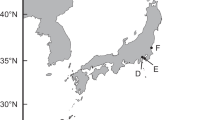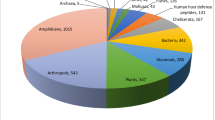Abstract.
The production of antimicrobial peptides represents a first-line host defense mechanism of innate immunity that is widespread in nature. Only recently such effectors were isolated in crustacean species, whereas numerous antimicrobial peptides have been characterized from other arthropods, both insects and chelicerates. This review presents findings on a family of antimicrobial peptides, named penaeidins, isolated from the shrimp Penaeus vannamei. Their structure and antimicrobial properties as well as their immune function will be discussed through analyses of penaeidin gene expression and peptide distribution upon microbial challenge.
Similar content being viewed by others
Author information
Authors and Affiliations
Additional information
Received 21 January 2000; received after revision 10 March 2000; accepted 10 March 2000
Rights and permissions
About this article
Cite this article
Destoumieux, D., Munoz, M., Bulet, P. et al. Penaeidins, a family of antimicrobial peptides from penaeid shrimp (Crustacea, Decapoda) . CMLS, Cell. Mol. Life Sci. 57, 1260–1271 (2000). https://doi.org/10.1007/PL00000764
Issue Date:
DOI: https://doi.org/10.1007/PL00000764




